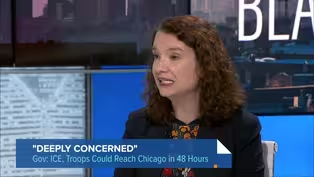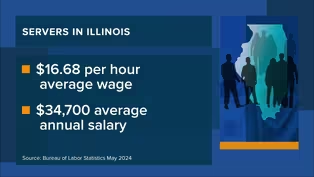Chicago Tonight: Black Voices
New Documentary Explores History, Legacy of HBCUs
Clip: 9/3/2025 | 7m 8sVideo has Closed Captions
HBCUs began more than 188 years ago and have undergone significant changes.
A new documentary called “Opportunity, Access and Uplift: The Evolving Legacy of HBCUs” profiles five students exploring common misconceptions and the current state of these institutions.
Problems playing video? | Closed Captioning Feedback
Problems playing video? | Closed Captioning Feedback
Chicago Tonight: Black Voices is a local public television program presented by WTTW
Chicago Tonight: Black Voices
New Documentary Explores History, Legacy of HBCUs
Clip: 9/3/2025 | 7m 8sVideo has Closed Captions
A new documentary called “Opportunity, Access and Uplift: The Evolving Legacy of HBCUs” profiles five students exploring common misconceptions and the current state of these institutions.
Problems playing video? | Closed Captioning Feedback
How to Watch Chicago Tonight: Black Voices
Chicago Tonight: Black Voices is available to stream on pbs.org and the free PBS App, available on iPhone, Apple TV, Android TV, Android smartphones, Amazon Fire TV, Amazon Fire Tablet, Roku, Samsung Smart TV, and Vizio.
Providing Support for PBS.org
Learn Moreabout PBS online sponsorship>> They've been around for over 188 years, HBCU or historically black colleges.
Universities were founded out of necessity when predominantly white institutions or pw barred black students from attending.
Since then, the institutions have experienced significant changes and challenges to say the least.
new documentary explores the current state of these institutions by profiling 5 students.
It's called opportunity Axis and uplift the law living legacy of HBC use.
Joining us now with more is a familiar face, the what all Iran to scream homes producer of this new documentary.
I have you in the hot seat.
Now got is if we are not alike.
Let's talk about your documentary.
You in a team.
A coal producers worked on this project for 2 years long time.
What was a passion behind?
>> making this documentary honestly, I'm so my co-producer, David Duncan, he came to me with the he had found some research and he had gotten interested in it and >> I got really excited about it.
You know, once we got the idea, like, yes, we should do a documentary about HBC use.
you know, the station has been very generous to allow me to do this as a side passion project.
So it is not a W t tw production.
But, you know, I attended an HBCU, my parents who grew up in the Jim Crow South, my aunts and uncles.
They all attended HBC use.
It was very familiar to me, but I knew that sort of the mainstream higher at conversation didn't give HBC use quite as much love.
not like they were unheard of.
But people tend to have only heard of the same handful Howard Morehouse Spelman.
So when I told people that I went to college in New Orleans, they're always like to go to Tulane.
I want to do when I would have said I went to 2 so that I have to follow up with I went to Dillard University.
It's an HBCU.
Oh, what's that?
And it's a whole other conversation.
So we're putting that conversation into this documentary and tell me about the students a little bit about the students that you follow.
Yeah.
So we spoke we tried to get as diverse a cast of students as we can considering that we're going to especially black schools, but with in especially black schools, you'll see you know, you learn in the documentary that a quarter of the student enrollment across HBC use is non-black, right?
So we talked to adopt a student in Delaware on, you know, we talked to a Latino students in New Orleans and we talked to many students who maybe hadn't heard of HBC use being that they are first generation to attend college or family are immigrants.
And so we got the diversity of students.
In addition Chicago, high schooler who decided to do trying to figure it out.
We go through his process with him and his family a little bit.
And then at the end is the surprise when you when you get to find out where he went, you know, the documentary offers an interesting perspective on the impact of COVID-19 on communities of color.
>> You know what was important?
Why was it important to address and what connection did to bring to students at HBCU schools?
So, you know, when interviewing Dr Michael Lomax, he's now the president of Uncf United College Fund formally and was also the president of Dillard University.
When I was a student in college.
>> There he he made the point that, you know, when America gets a cold, black America gets the flu and I think he was making the point that it is something similar with HBC use, right?
If if you know schools where the country struggling with something it is.
It's going to be a little bit worse for black America or black students.
And so I think the same might be argued now as universities are sort of in the hot seat and experiencing losing funding those funding cuts, hurt black schools just that much more because their funding is already a little bit smaller than what a typical pwr I are comparable pw.
I might be able to use your dog.
Also talk touches on the comparison between HBC use pw eyes which you mentioned.
They're predominantly white institutions.
Let's take a listen.
>> I really know that much about HBC because I lived in a more of a predominantly white areas, but never the HBCU conversation with every spoken to me because, you know, let it be season.
I looked up on the same way as the pw rights are.
>> What was it like for you be the students?
Well, I will be honest with the Delaware State students.
My partner, Mario, one of our co-producers.
He actually went to Delaware State.
Couldn't do it all.
But I went to Dillard University.
And so it was a lot of fun to talk to them about their experience.
I know why I went to an HBCU.
I have a sense of why my family members and my friends went to an HBCU, but today is different, right?
You know, they're choosing HBC.
Use in a different And so I really curious about why they chose an HBCU and what their experience was like wasn't much different from mine.
Were their reasons much different from mine.
And I think everybody's obviously you've got your own reasons for choosing where you go to school.
But some of us are going to have some things in comments till like to go back there.
So much back to campus very much until I went back for the at Dillard.
And so it was it was a lot of fun.
It was also very interesting to see some of the changes that have happened on campus over the years.
And then some of the parts that were still there that, you know, that we're just like when I was there people right Now community was a common theme in the dock.
Students attended these institutions because they wanted to feel a sense of belonging.
But you also get personal talk about the common trope that it still prevalent in the black >> community today defining your blackness.
Did you ever feel out of place because of that stigma?
I'm not sure that I felt out of but I think, you know, going from, you know, I grew up in Vicksburg, Mississippi and my high school was very much white and black right to the it's in its Mississippi.
So they worked hard to make sure that our classes where >> fifty-fifty that, you know, our enrollment was 50% white, 15% black were 49.
49 and 2% And so and that's what the real world is, right?
It is diverse.
And so there was a little bit of culture shock arriving on a campus that is pretty much all black students at the time when I enrolled in the late And so I never felt out of place.
But I did love getting to meet.
Also at the black people write like people from varying experiences because that's that's what it is, right.
We're all going to have different experiences in life.
And that is the case for for anyone, right?
Not just black people.
Did you feel the same time to meet with the You did interview a dealer that.
>> They had that pride or are they were feeling like all is somewhere where I can thrive?
Yes, yes, absolutely.
And that that's the case for anyone.
Not just not just the black students that were on campus there.
You know, I know this is a question that we always ask.
But you know, what do you hope that people take away from this documentary that you work so hard Yes, thank you.
I hope that, you know, for my fellow HBCU alumni, I hope that they see themselves and that they recognize their own experiences in the film.
And for folks who maybe aren't so familiar with that, I hope that they come away with a familiarity and an understanding and appreciation.
>> For the schools and also be a little bit of recognition that they like while they have educated so many black people over the years, they are not just for black people than ever have been.
They were started people in mind, obviously, but not just for black people that that HBCU is for anyone congrats on press putting this documentary together.
I'm sure there was so much.
>> Sweat, blood and tears into ways that you can't.
You can watch the documentary Sunday
Violence Interrupters Prepare for Federal Troops in Chicago
Video has Closed Captions
Clip: 9/3/2025 | 3m 54s | Gov. JB Pritzker said the White House has not been communicating with Illinois officials. (3m 54s)
What to Know About Changes to Minimum Wage for Tipped Workers
Video has Closed Captions
Clip: 9/3/2025 | 9m 38s | The One Fair Wage ordinance took effect in Chicago last year. (9m 38s)
Providing Support for PBS.org
Learn Moreabout PBS online sponsorship
- News and Public Affairs

Top journalists deliver compelling original analysis of the hour's headlines.

- News and Public Affairs

FRONTLINE is investigative journalism that questions, explains and changes our world.












Support for PBS provided by:
Chicago Tonight: Black Voices is a local public television program presented by WTTW

